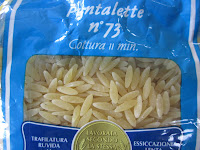I have been called many things in my time but I think far and away the funniest is a "Pasta Snob"!
So I'm a bit fussy when it comes to how my pasta is cooked and the shapes of my pasta I eat, and let's face it, there are many different types. But, I'm not talking about things like Ravioli or Tortellini which have various fillings or Gnocchi, which are a form of dumplings. I'm not talking about Fresh Pasta which cooks much quicker than dried pasta and isn't hard to begin with. I'm not even talking about Egg Pasta and I'm certainly not talking about Tinned Pasta! Yikes! I'm talking about plain old dried pasta. The stuff you've all probably got in your kitchen cupboards, in a 500g packet, which lasts forever. (almost)
It's all made from the same stuff but it's shaped differently. Well actually, that's not entirely true. Like everything you buy in the supermarket, there are different brands of pasta. Some are cheaper than others and are made from different types of flour. I don't care what anyone says here, there is a difference between brands. If you compare a cheap brand with an expensive one and couldn't tell the difference between them, it's because you don't really like pasta and any old stuff will do.
Here are some of the brands of Pasta that I would happily eat. (providing they're not over cooked that is) De Cecco, Barilla, Molisana and Agnesi. I can stomach Napolina but I'd be hard pushed to buy Buitoni.
All of the above have to be cooked for the length indicated on the packet. A few seconds less is good with me but if you start adding minutes, I'm no longer interested and dinner will have to be cancelled. I like my past Al dente. In other words a bit firm, not crunchy and certainly not soft.
If I go to an Italian restaurant to eat, I will only ever choose Gnocchi as a pasta option. (you can't go wrong cooking Gnocchi) Restaurants, even though they have pukka chefs cooking, rarely cook the pasta to my liking. Many restaurants have the pasta cooked half way in preparation for an order to be placed, so all they have to do is throw the already partly cooked pasta into some boiling water for the remaining cooking time required and voila! Although there's nothing wrong with that method, I'd never do it at home and it kind of puts me off my food a bit. It also means the cooking time gets messed up and the result is over cooked pasta.
So what about the different pasta shapes? This is where it gets interesting. Let's take just one brand of pasta, De Cecco in this case, and take a look at the different shapes. I can't stand Shells (Conchiglie) or Butterflies (Farfalle)! Even when cooked perfectly, I just don't like them. I'm afraid I don't have any photos of my own for these because, I don't have any of these shapes in the house - for obvious reasons. Hence the links above. :-)
I do, however, really like Rigatoni, Penne Rigate (I always prefer pasta rigata - with grooves - than lisca - smooth) and Fusilli.


Finally, and this post has taken a lot longer than I expected it to, so I hope you're still with me, I'm going to mention one of my very favourite pasta shapes. Tubetti or Tubettini. As with the pastina, I never eat this with a pasta sauce. I always have it mixed with either peas, potatoes or beans, sometimes lentils or chic peas but I prefer to use other shapes with the latter. Yes, I know it sounds weird but it's delicious and so quick and easy to make. (If I get any interest from this post, I'll post a recipe some time). The only thing is, it has to be the small stuff. You can't use the larger stuff because the peas or whatever you're using, get stuck inside the pasta. Different brands are different sizes so you have to be a bit selective with these. I would prefer the Tubetti Rigati - with grooves - but they're not that easy to find in the UK so I have to settle for Lisci - smooth - here.
There are so many different shapes and sizes of pasta and I have mentioned just a few. Only the ones I really like or really don't like. If you're Italian, you can probably relate to this post and see exactly where I'm coming from. If you're not, you probably think I'm insane and will dismiss it as soon as you've read it. I'd love to hear your comments either way and will leave you with a Buon Appetito!






